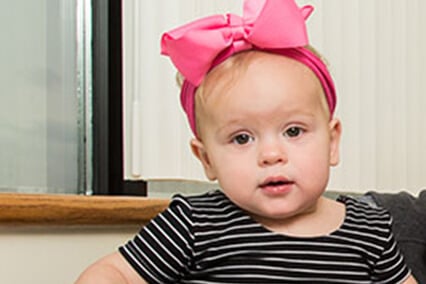Fetal Cardiology: Levi's Story
Being in the right place – at the right time
When a fetal echocardiogram reveals a critical heart defect—and the baby has to undergo life-saving cardiac surgery only eight days after birth—you don’t expect the mother to label the experience as “awesome.” But Traci Pierson actually describes her son Levi’s birth in even more glowing terms. “Despite the fact that my child had a serious birth defect,” Traci said, “I look back on his delivery as even better than my first son’s”—a remarkable statement considering that big brother Liam was born with no health concerns.
Overcoming the challenges
Levi’s health, on the other hand, was much more complicated. A routine ultrasound during pregnancy detected a hole between the bottom two chambers of Levi’s heart. While serious, that worry was trumped by the results of a follow-up fetal echocardiogram: an interrupted aortic arch.
Before birth, a defective aorta isn’t a danger because the ductus arteriosus—a specialized fetal blood vessel—handles the job. Problems arise after birth, however, when that connection naturally constricts and closes. In Levi’s case, that ordinary occurrence would have resulted in dire consequences because his heart couldn’t have worked as it should.
Pinpointing the cause
Discovering such defects early is critical, as is getting treatment at the proper facility. Otherwise, Levi could have been delivered and discharged before any problem was recognized. “If that had happened, Levi would have become very sick, and he probably would have showed up in an emergency room,” said his cardiologist. “He could have had brain damage, organ damage—if he even survived at all.”
Anticipating such an outcome, doctors recommended Traci deliver her baby at Children’s Mercy’s Fetal Health Center. That choice allowed doctors to immediately set up an arterial infusion of prostaglandins into Levi’s veins soon after birth. This procedure kept his ductus arteriosus from closing and gave James O’Brien, M.D., Levi’s surgeon, the time needed to repair his “missing” aorta.
Fully restored
Eight days later, Levi headed home with his family. Today, the toddler is doing so well that doctors recently switched him from six-month check-ups to annual ones—just like any healthy baby.
Looking back, Traci has no hesitation recommending Children’s Mercy to other parents. “In my opinion, Children's Mercy is the place to be for a sick child that needs any type of care,” she said. “Even if you took them to regular facilities, chances are they are going to be referred to Children's Mercy. So, in my opinion, you might as well start with the best and end up with the best results.”
Fetal cardiology: Baldwin family's story
Follow the Baldwin family's journey through the Fetal Cardiology Program at Children's Mercy when their son Hartman was prenatally diagnosed with Hypoplastic Right Heart Syndrome.
Fetal cardiology: Hazel's story
Doctors at Children’s Mercy diagnosed Hazel Moffett’s heart defect before she was born, and repaired it when she was only 8 days old. Today the 1-year-old is developing normally—laughing and playing.
